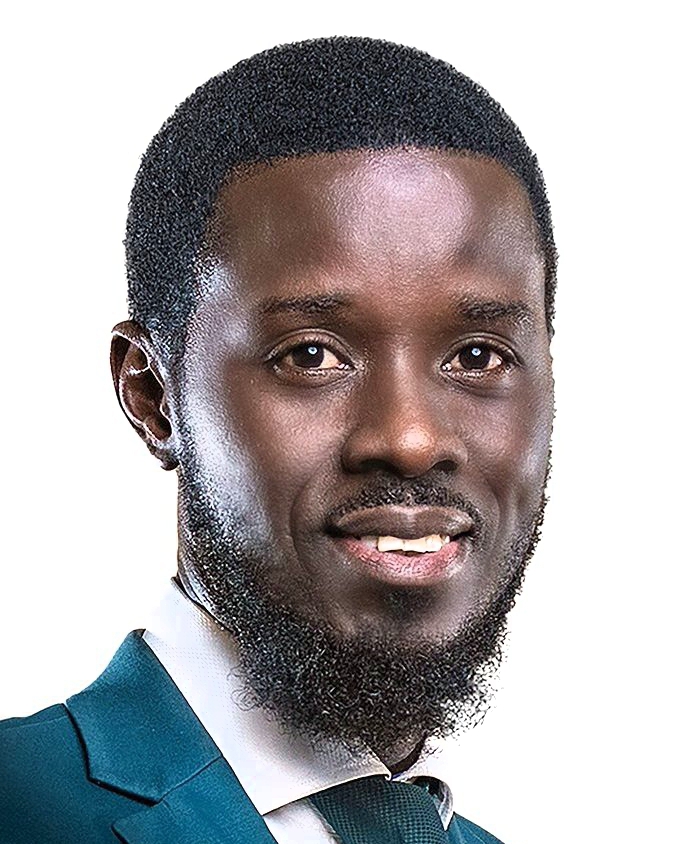Meets Senegal’s 44 Years Old President-Elect: Bassirou Diomaye Faye

Senegal has just elected its youngest president -Bassirou Diomaye Faye who was the opposition leader that led the race in Senegal’s presidential election.
Faye will be taking over as the country’s fifth president by the outgoing President Macky Sall, who is stepping down after a second term. Bassirou Diomaye Faye (born 1980) is a Senegalese politician and a former tax inspector.
Millions of Senegalese nationals took part in a peaceful vote on Sunday, following three years of turbulence and opposition protests against the incumbent, Macky Sall.
Brief profile
Bassirou Diomaye Faye, a Senegalese politician and a former tax inspector was born in 1980.
He was the former general secretary of dissolved PASTEF and is running for president in the 2024 election in place of disqualified candidate Ousmane Sonko.
Faye obtained his baccalaureate in 2000 and later secured a master’s degree in law.
Subsequently, he passed competitive exams, gaining admission to both the National School of Administration (ENA) and the magistracy in 2004.
He later opened for a career as a tax inspector in the Tax and Estates department post-graduation. It was there Faye forged a friendship with Sonko, a fellow alumni from the same school and a future Politician in Senegal.
Political career
Their bond deepened in 2014 within the Taxes and Estates Union, established by Sonko, the leader of the newly formed PASTEF. During his tenure in the union, Faye advocated for facilitating homeownership for tax and property agents.
In his political career, initially a guest at the party’s inception, Faye swiftly rose to prominence within PASTEF. He played a pivotal role as one of the ideologues and architects of Sonko’s presidential program in 2019, where Sonko secured nearly 16% of the vote, finishing third
In February 2021, Faye assumed the role of general secretary of PASTEF following Sonko’s arrest on rape allegations. He endeavored to unite the opposition for the 2022 elections, resulting in the ‘Liberate the People’ alliance winning 56 seats.
Amid uncertainties over Sonko’s eligibility for the presidential election, PASTEF endorsed Faye in November 2023 as its candidate for the 2024 presidential election, despite his detention. Although running as an independent after PASTEF’s dissolution, Faye’s candidacy was validated by the Senegalese Constitutional Council.
On 15 March 2024, a day after Faye’s release from jail, he launched his presidential campaign, garnering support from former president Abdoulaye Wade and his Senegalese Democratic Party (PDS), further bolstering his electoral prospects.
Throughout his campaign, Faye pledged to create jobs, combat corruption, and review energy contracts. He is running under the slogan “Diomaye mooy Ousmane,” hoping to leverage Sonko’s popularity among Senegal’s youth
Faye’s imprisonment in April 2023, and subsequent release in March 2024, marked significant events in his political journey. During his detention, political tensions rose, leading to widespread protests and calls for electoral transparency.
Regarding his political positions, Faye advocates for system change and left-wing pan-Africanism, emphasizing Senegal’s sovereignty. He vows to reduce presidential powers, fight corruption, and implement monetary reforms, among other initiatives aimed at enhancing Senegal’s economic and social development.
Meanwhile the ruling coalition candidate Amadou Ba has conceded defeat in the just concluded presidential election. Ba on Monday called Bassirou Diomaye Faye, to recognise the opposition candidate’s win in Sunday’s presidential election.
“Considering the trends of the presidential election results and awaiting the official declaration, I congratulate the president Bassirou Diomaye Diakhar Faye on his victory in the first round,” Ba said in a statement on Monday. Since Sunday evening when the polls closed, opposition party supporters have been celebrating on the streets around the country th ough the vote count is still on and results are not expected until later this week.
To win in the first round, a candidate must gain more than 50% or it goes to a runoff. But according to opposition suporters, the preliminary trends cannot be disputed, making a run-off election inconceivable.
Voters have also praised the peaceful conduct of the election amid preveious concerns of a likely unrest. The months leading up to the election saw deadly protests ignited last year by the jailing of the popular opposition leader Ousmane Sonko.
“I’m satisfied because we can see that democracy is advancing in our country. We really hope that the new president, who is elected by the majority, will manage the country well” said Mohamed Mbaye, a Dakar resident.
This is Senegal’s fourth democratic transfer of power since gaining independence more than six decades ago.

